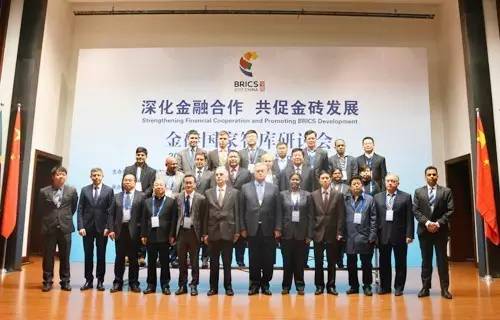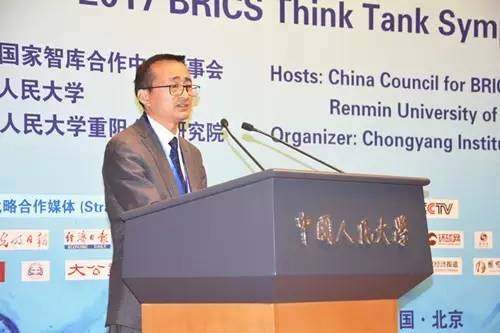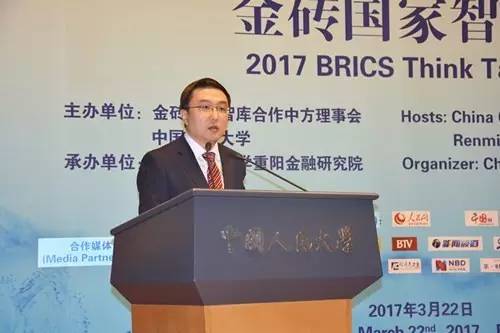Priyanka Pandit: BRICS, A New Trend in Multilateralism?(2)
2017-03-26 编辑:
In this context, China has identified itself as `the major developing country` that would promote the interest of other developing countries in an international system marked by the transition to multipolarity.
For any institutional grouping, inter-regional coalitions are the order of the day. However, these coalitions are never without leadership, who represent the concerns of the coalition, take initiatives and negotiate its interests in the larger forum. In BRICS, China remains the undeclared leader, despite the group`s opposition to unipolarity.
Additionally, there are issues related to both intra-regional and inter-regional differences which challenge the cohesiveness of the grouping.
First, the BRICS are geographically, politically and economically a diverse group with little commonality in terms of values and interests. These political differences often form the basis of their differing positions on various other forums of global governance, thus, revealing the inherent fractures within the BRICS community.
Second, with regard to economy, China and India are commodities importers, China specialises in manufactures and India in services. By comparison, Russia and Brazil are commodities exporters, Russia is rich in natural resources and Brazil in agriculture. Since the drivers of economic growth differ in these countries, they take different approach with respect to key issues in the WTO.
Also, these institutional arrangements are rife with insecurities. The factors, discussed above, act as major barriers to the emerging market powers as they seek adjustments in their course of reforming the global order. Therefore, BRICS responses to the tensions of continuity and discontinuity, contested neoliberal norms, and regional differences will bear greatly on the evolution of global order in the coming decades.
The transition also suggests a hybrid system of global governance, where the provision of collective goods is no longer confined to the hands of the superpower but has become a matter of collective goodwill.
You May Like:
2017 BRICS Think Tank Symposium Held in Beijing to Mark the BRICS China Moment
2017 BRICS Think Tank Symposium on the theme of “Strengthening Financial Cooperation and Promoting BRICS Development” was held at Renmin University of China on March 22th, 2017. The symposium was hosted by China Council for BRICS Think-Tank Cooperation (CCBTC) and Renmin University of China (RUC), and organized by Chongyang Institute for Financial Studies, Renmin University of China (RDCY).
This is the first think tank symposium among BRICS countries following the 9th BRICS Summit’s first Sherpas Meeting held in Nanjing in 2017. More than 300 participants, including foreign diplomats to China from BRICS countries, and representatives from business, academy, and media, gathered at The symposium to mark the beginning of the China moment of the BRICS think tanks.

2017 BRICS Think Tank Symposium was held in Beijing.
Liu Yuanchun, Vice President of RUC, Wang Xiaolong, Special Envoy for BRICS Affairs, Luan Jianzhang, Secretary General of CCBTC and Director General of Research Office at International Department of the Central Committee Communist Party of China, and Chen Xin, Vice President of CCBTC and President of Guangdong University of Technology, attended the symposium and delivered the opening remarks. Dolana Msimang, Ambassador of South African Embassy in Beijing, George Zinoviev, Minister Counselor of Russian Embassy in China, Amit Narang, Deputy Chief of Mission at Indian Embassy in Beijing, Carlos Henrique Angrisani Santana, a representative of Brazilian ambassador to China, Zhao Jinping, Research fellow and Director-General of the Research Department of Foreign Economic Relations at Development Research Center of the State Council (DRC), and Zhou Qiangwu, Director of International Economics and Finance Institute of the Ministry of Finance, delivered keynote speeches at the opening ceremony.

Liu Yuanchun, Vice President of RUC, delivers a speech at the symposium.
Liu Yuanchun pointed out that BRICS mechanism set a good example for the cooperation of emerging and developing countries. As the globalization faces great challenges, BRICS has the responsibility to provide new impetus for the development of the world, shoulder the mission of building the community of human destiny, and find new idea and mechanism for the cooperation among countries.

Wang Xiaolong, Special Envoy for BRICS Affairs, delivers a speech at the symposium.